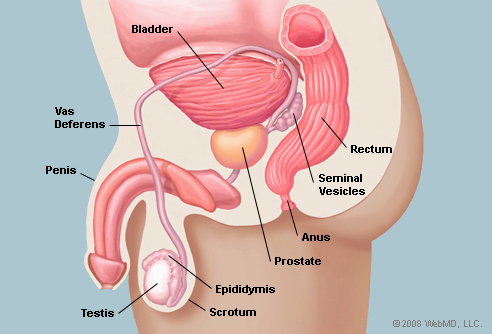
When the prostate gland is inflamed for any reason, it is known as prostatitis. Specialized doctors known as urologists diagnose and treat this and other male reproductive diseases.
A sudden onset of it may develop secondary to an invasive procedure, trauma, infections, and bladder obstruction. Men ages 20-35 with multiple sexual partners are at an increase risk as are those who practice anal sex without protection. Men who have an enlarged prostate are at an increased risk of urinary infection.
Signs and Symptoms
Urinary frequency, slow stream, and pain on urination, urgency, difficult urination
Impotence, aching penis with lower abdomen and testicular discomfort
Pain between genitals and anus, painful bowel movements and ejaculation
Blood in urine, incontinency, retention
Urine tests for bacteria and white blood cells
Anal palpation of the swollen prostate
An elevated blood prostate antigen hormone
Antibiotics (such as Cipro) for at least 4 weeks, sometimes up to 8 weeks
Stool softeners to reduce discomfort
Some men may have to perform catheterizations to remove retained urine. Frequent and complete bladder evacuation is recommended to decrease symptoms of urinary retention and urgency
Avoid substances that irritate the bladder such as alcohol, caffeine, citrus juices, hot and spicy foods
Increasing fluid intake helps flush bacteria from bladder
Remeron, an antidepressant, has side effects that greatly mimic such as urinary frequency, dysuria, incontinency, urgency, retention, and impotency. The urologist utilizes all available facts, medicine, and medical history to diagnose and treat it based on its cause. This is an example that not all is caused by an infectious agent.
The prostate is known as “a reservoir for the recurrent infection.” Patients with (CBP) “often present with myriad subjective complaints. Only a few of these complaints offer diagnostic clues for CBP because the complaints are often not of an unusual nature and are not specific for CBP.” CBP is a recurrent urinary tract infection with a single organism that persists in the prostatic fluid. (Ahuja, 2008).
If culture “results are positive, an expressed prostatic secretion (EPS) that contains bacteria of more than 10 WBCs per high-power field (WBCs/hpf) confirms the diagnosis.” (Ahuja).
After treatment , the majority of men are symptom free but prone to recur and likely to develop chronic P. Early diagnosis and a full course of the appropriate treatment are necessary. Frequent urinary tract infections carry the risk of the infection entering the bloodstream. Safe sex and good hygiene is strongly encouraged.
Look at Prostatitis Symptoms letting in 34 medical signs and symptoms of Prostatitis. Prostatitis causes and symptoms website gives you collection of useful articles & updated news.
Share and Enjoy:
Related posts:
- Symptoms & Signs of Gallbladder Problems The gallbladder is a small, pear shaped organ, situated just…
- Treat Feline Diabetes with Diabetic Cat Food The most important thing you can do as a cat…